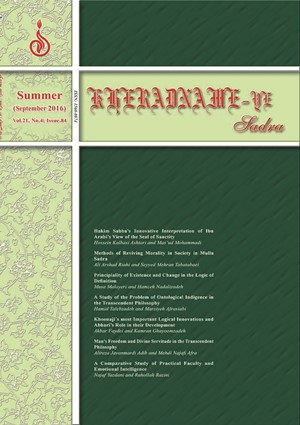A Comparative Study of Practical Faculty and Emotional Intelligence
Subject Areas :Najaf Yazdani 1 * , Ruhollah Razini 2
1 -
2 -
Keywords: Soul practical faculty emotional intelligence philosophy psychology,
Abstract :
A theme which is commonly discussed in philosophical psychology and modern psychology is attaining the knowledge of the various dimensions of human existence through different methods. One of these dimensions is the non-cognitive dimension of human beings, which has been mentioned in philosophical psychology in the discussion of practical faculty. Today, it has attracted the attention of psychologists under the title of emotional intelligence (EI) or emotional quotient (EQ). Some philosophers advocate a cognitive approach and some a non-cognitive one to this faculty. Still, some of them basically deny the existence of an independent practical faculty. Among the interpretations provided for Man’s practical faculty, the non-cognitive interpretation seems to be the correct one. In psychology, too, some capacity-based, non-cognitive, and competency-based models have been developed for EQ. From among them, the second and third models are more consistent with the selected interpretation of practical faculty in philosophy. The non-cognitive dimensions of human beings affect many human acts, and even their epistemological dimensions are sometimes influenced by their non-ideological aspects. Therefore, it is of great importance to study modern psychologists’ views of EQ and compare them with old psychological discussions of practical faculty. By comparing the views regarding this dimension in the two realms of modern psychology and philosophical psychology, this paper demonstrates that one of the important dimensions of Man’s development is the non-cognitive one, attaining a thorough knowledge of which can provide us with a more complete knowledge of human beings.
ابن سينا، النجاة، بكوشش محمدتقي دانش پژوه، تهران، دانشگاه تهران، 1364.#
ابن سينا، الاشارات و التنبيهات، قم، نشر البلاغه، 1375.#
ابن سينا، عيون الحكمه، مقدمه و تحقيق عبدالرحمن بدوي، بيروت، دارالقلم، 1980.#
ابن سينا، رساله احوال النفس، پاريس، دار بيبليون، 2007.#
ابراهيمي ديناني، غلامحسين، منطق و معرفت در نظر غزالي، تهران، امير كبير، 1370.#
اونامونو، ميگل، درد جاودانگي (سرشت سوگناك زندگي)، ترجمه بهاءالدين خرمشاهي، تهران، ناهيد، 1388.#
بهمنيار، ابن المرزبان، التحصيل، تهران، موسسه انتشارات و چاپ دانشگاه تهران، 1375.#
برنجكار، رضا، دانشنامة امام علي (ع)، زير نظر علي اكبر رشاد، چاپ سوم، تهران، پژوهشگاه فرهنگ و انديشه اسلامي، 1385.#
برادبري، تراويس و جين گريوز، آزمون هوش هيجاني، ترجمه مهدي گنجي، تهران، ساوالان، 1384.#
بهشتي، سعيد، آيين خردپروري، پژوهشي در نظام تربيت عقلاني، بر مبناي سخنان امام علي(ع)، تهران، موسسه فرهنگي دانش و انديشه معاصر، 1386.#
جوادي آملي، عبدالله، مبادي اخلاق در قرآن، قم، اسراء، چاپ ششم، 1387.#
جوادي آملي، عبدالله، حكمت نظري و عملي در نهج البلاغه، قم، اسراء، 1376.#
جوادي آملي، عبدالله، مراحل اخلاق در قرآن كريم، قم، اسراء، 1378.#
جوادي آملي، عبدالله، تبيين براهين اثبات خدا، قم، اسراء، 1386.#
جوادي آملي، عبدالله، رحيق مختوم، قم، اسراء، 1386.#
جلالي، احمد، «هوش هيجاني»، فصلنامه تعليم و تربيت، ويژهنامه ارزشيابي تحصيلي، ش 69 و70، 1385.#
حائري يزدي، مهدي، كاوشهاي عقل عملي، تهران، مؤسسه پژوهشي حكمت و فلسفه ايران، 1384.#
رازي، قطب الدين، المحاكمات بين شرحي الاشارات، قم، نشر البلاغه، 1375.#
سبزواري، ملاهادي، شرح المنظومه، تهران، نشر ناب، 1369.#
سبزواري، ملاهادي، اسرار الحكم، مقدمه صدوقي سها، قم، مطبوعات ديني، 1383.#
غزالي، ابوحامد محمدبن محمد، مقاصد الفلاسفه، ترجمه دكتر محمد خزائلي، تهران، موئسسه انتشارات امير كبير، 1363.#
غزالي، ابوحامد محمدبن محمد، معيار العلم في المنطق، چاپ اول، بيروت، دار و مكتبه الهلال، 1993م.#
فاطمي، سيدمحسن، هوش هيجاني، تهران، سارگل، 1385.#
فارابي، فصول منتزعه، مترجم حسن ملكشاهي، تهران، سروش، 1382.#
كاپلستون، فردريك، تاريخ فلسفه، ج1، ترجمه سيد جلالالدين مجتبوي، تهران، سروش، 1385.#
گلمن، دانيل، هوش هيجاني، ترجمه نسرين پارسا، تهران، رشد، 1380.#
مدرسي، سيد محمد رضا، فلسفه اخلاق، پژوهش در بنيانهاي زباني، فطري، تجربي، نظري و ديني اخلاق، چاپ دوم، تهران، سروش، 1376.#
ملاصدرا، الحكمة المتعالية في الاسفار العقلية الاربعة، ج6، تصحيح، تحقيق و مقدمه دكتر احمد احمدي، تهران، بنياد حكمت اسلامي صدرا، 1381.#
ملاصدرا، الحكمة المتعالية في الاسفار العقلية الاربعة، ج8، تصحيح، تحقيق و مقدمه علياكبر رشاد، تهران، بنيادحكمت اسلامي صدرا، 1383.#
ملاصدرا، الشواهد الربوبيه في المناهج السلوكيه، تصحيح، تحقيق و مقدمه آيتالله دكتر سيدمصطفي محقق داماد،، تهران، بنياد حكمت اسلاميصدرا، 1382.#
ملاصدرا، المظاهر الالهيه في اسرار العلوم الكماليه، تصحيح، تحقيق و مقدمه آيتالله سيد محمد خامنهاي، چاپ اول، تهران، بنياد حكمت اسلاميصدرا، 1378.#
ملاصدرا، شرح الهدايه، ج2، تصحيح، تحقيق و مقدمه دكتر مقصود محمدي، تهران، بنياد حكمت اسلامي صدرا، 1393.#
ملاصدرا، مفاتيح الغيب، تصحيح، تحقيق و مقدمه دكتر نجفقلي حبيبي، تهران، بنياد حكمت اسلاميصدرا، 1386.#
مير دريكوندي، رحيم، «هوش هيجاني، پيشينه و رويكردها از نگاه دين و روان»، فصلنامه روان شناسي و دين، سال چهارم، شماره سوم، 1390.#
نراقي، مهدي، علم اخلاق اسلامي، ترجمه سيد جلال الدين مجتبوي، ج1، چاپ نهم، تهران، حكمت، 1389.#
Corsini, J. R., The Dictionary of Psychology, UK and USA, Taylor & Francis Group, 1999.#
Caruso, D. R., & Wolfe, C. J., Emotional Intelligence and Leadership Development. In D. V. Day, S. J. Zaccaro & S. M. Halpin (Eds.), Leader development for transforming, organizations: Growing leaders for tomorrow (pp. 237-263). #
Mahwah, NJ: Lawrence Erlbaum Associates Publishers, 2004.#
Gardner, L.& Stough, C., “Examining the relationship between leadership and emotional intelligence in senior level managers”. Journal of Leadership& Organizational Development. pp 68-78, 2002. #
Livingstone, Holly, Emotional intelligence and military leadership, Canada: the Minister of National Defence, 2002. #

